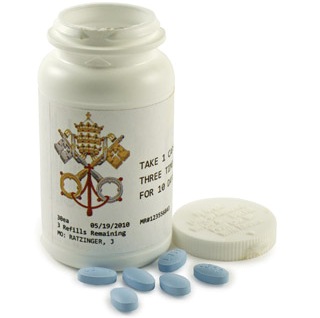The pope’s stance on health care may be hard pill to swallow for opponents of reform.
More than 100 million people a year across the world are driven into poverty because of the cost of illness or “catastrophic injury,” the United Nations reported in November. Whether in the affluent or the developing world, nations that rely on individual resources to sustain health care systems (rather than pooled government resources) produced the highest amount of health-related impoverishment among their citizens.
World Health Organization officials, arguing that the need “has never been greater” because of the worldwide economic slowdown, globalization of disease, and an aging world population that will need more care for chronic conditions, are calling for an international campaign for universal health care.
As a nation, the United States remains far from the goal of universal coverage. But the recent health care reform effort, derided as “Obamacare” by its many detractors, at least steps toward treating health care as a human right rather than a commodity. Although it will be years before U.S. health care reform takes complete shape, assuming it survives the congressional and judicial challenges ahead, one component of reform is already protecting Americans and addressing one of WHO’s major preoccupations.
In the United States the main cause of personal bankruptcy has been the overwhelming medical costs of a major health crisis, even for people who thought they had “good” health insurance. Beginning last September, the reform package initiated restrictions on the annual limits insurers can place on their plans, and those limits will be phased out completely by 2014. Also in September the practice of searching for technical errors in applications in order to deny the sick or injured insurance precisely when they need it most was outlawed. Together these two small steps will prevent thousands of American families from facing ruin because of a medical crisis.
Health reform has proved a rallying point for many opposed to the Obama administration’s actual or purported initiatives, although when reform’s specific goals and progress points are diagrammed, many “opponents” end up supporting the reform’s milestones.
“Obamacare” has proved a useful organizational tool for the Tea Party, which has drawn the support of a good number of Catholics. I offer a kindly warning to Tea Party hosts so eager to receive Catholic RSVPs: Guess who else is coming to dinner? Pope Benedict XVI, carrying a delectable platter of more than 100 years of Catholic social teaching.
In fact Pope Benedict joined WHO’s call for universal health coverage just before its report hit the press. He called health care a moral responsibility of government and an “inalienable right,” regardless of social and economic status or ability to pay. He cautioned that the privatization of health care should “not become a threat to the accessibility, availability, and quality of health care.”
Pope Benedict also recently called for “renewed evangelization of the church’s social doctrine,” reminding laypeople that they have “the immediate task of working for a just social order.” One concept of that social doctrine, subsidiarity, has been twisted into odd shapes lately in an effort to get it to conform to our dominant culture’s more ruggedly individualistic impulses. But subsidiarity relates more to preventing government from thwarting individual expression in addressing civic concerns; it does not, as some suggest, absolve government from a responsibility to respond to pressing social needs.
Catholics helped codify the recently derided ideals of “social justice.” We embrace our communal and personal responsibilities; the sojourner and orphan are not objects of our charity but brothers and sisters we seek to stand with and hold up, not just help out. Subsidiarity will have a defining role to play—along with other Catholic notions such as the common good, human dignity, and the preferential option for the poor—as we work through whatever form our health care system finally takes.
Let’s hope that when our Catholic brethren play musical seats at the Tea Party, they will leave a place for our pope’s recent exhortations and the rich tradition of social justice that has been the lifebreath of our holy, imperfect communion.
This article appeared in the February 2011 issue of U.S. Catholic (Vol. 76, No. 2, page 39.)
Image: Tom Wright












Add comment